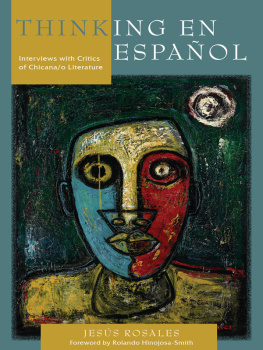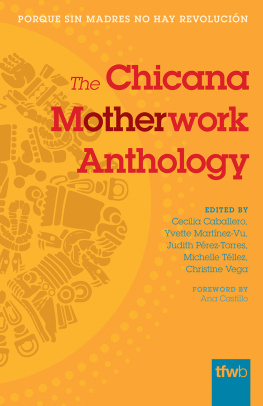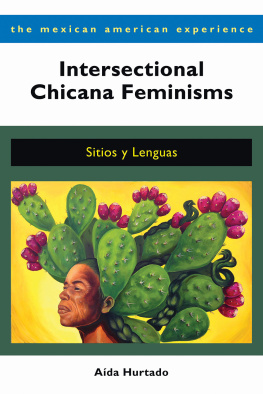From the Edge
Latinidad
Transnational Cultures in the United States
This series publishes books that deepen and expand our understanding of Latina/o populations, especially in the context of their transnational relationships within the Americas. Focusing on borders and boundary-crossings, broadly conceived, the series is committed to publishing scholarship in history, film and media, literary and cultural studies, public policy, economics, sociology, and anthropology. Inspired by interdisciplinary approaches, methods, and theories developed out of the study of transborder lives, cultures, and experiences, the titles enrich our understanding of transnational dynamics.
Matt Garcia, Series Editor, School of Historical, Philosophical, and Religious Studies and Director of Comparative Border Studies, Arizona State University
For a list of titles in the series, see the last page of the book.
Library of Congress Cataloging-in-Publication Data
Names: Fagan, Allison E., 1982 author.
Title: From the edge : Chicana/o border literature and the politics of print / Allison E. Fagan.
Description: New Brunswick, New Jersey : Rutgers University Press, [2016] | Series: Transnational cultures in the United States | Includes bibliographical references and index.
Identifiers: LCCN 2015037352| ISBN 9780813583808 (hardcover : alk. paper) | ISBN 9780813583792 (pbk. : alk. paper) | ISBN 9780813583853 (e-book (epub)) | ISBN 9780813583907 (e-book (web pdf))
Subjects: LCSH: American literatureMexican American authorsHistory and criticism. | Mexican AmericansBooks and reading. | Authors and readersUnited States. | Mexican Americans in literature.
Classification: LCC PS153.M4 F34 2016 | DDC 810.9/86872dc23
LC record available at http://lccn.loc.gov/2015037352
A British Cataloging-in-Publication record for this book is available from the British Library.
Copyright 2016 by Allison E. Fagan
All rights reserved
No part of this book may be reproduced or utilized in any form or by any means, electronic or mechanical, or by any information storage and retrieval system, without written permission from the publisher. Please contact Rutgers University Press, 106 Somerset Street, New Brunswick, NJ 08901. The only exception to this prohibition is fair use as defined by U.S. copyright law.
Visit our website: http://rutgerspress.rutgers.edu
This book is the culmination of years of thinking about and living on the edges of texts. Though it took me years to figure it out, from my high school days reading The House on Mango Street to my undergraduate studies at Saint Xavier University in Chicago through my dissertation at Loyola University in Chicago, I have been compelled to examine the material borders of literature for signs and clues to how they were made. But I have also been compelled by a simple love of stories, and of reading and writing and the opportunity to make it my life. The Chicana/o novels and stories I have been fortunate to spend the past several years with have been great company and great inspiration, and Im so grateful to have been welcomed into their worlds.
This book began as my dissertation, which in turn began as a series of discussions in a class on transnational and border literatures taught by Paul Jay at Loyola University in the summer of 2006. Paul would later chair my dissertation committee, and I have benefited immensely from his guidance and his enthusiasm for this literature that has made a home in my heart. Fellow committee members Steven Jones and Suzanne Bost were also instrumental in challenging my ideas about textual scholarship and Chicana/o literature, respectively; Suzanne in particular has been a model not only of scholarship but also of generosity and thoughtfulness, and her encouragement has meant the world to me. Loyola was a wonderful place to live and work. I was fortunate to work with and also wish to thank Badia Ahad, Pamela Caughie, Suzanne Gossett, Joyce Wexler, Harveen Mann, Jack Kerkering, and, perhaps most important, Moe Taylor for their guidance and support.
Likewise, at James Madison University (JMU) in Harrisonburg, Virginia, I have had the good fortune of working with dedicated mentors, including Mark Parker and Dabney Bankert, who have been tireless in their efforts to encourage my research and writing. The writing group that has welcomed me at JMUSin White, Dawn Goode, and Mollie Godfreyhas also read various drafts with sensitivity, offering important insights as well as some good laughs, and the JMU English department faculty as a whole has offered encouragement in ways large and small. My gratitude goes to Matt Rebhorn, Mary Thompson, Brooks Hefner, Maria Odette Canivell, and Erica Cavanaugh, in particular, who have all been exceedingly kind and supportive, and to Rose Gray, who has never failed to have an answer to one of my questions.
Researching this book involved visits to archives and conversations with authors, and the Graduate Program at Loyola was instrumental in funding travel to research the archives of Ana Castillo. I thank in particular Sal Gerea at the University of California, Santa Barbara, for his assistance with Ana Castillos archives, as well as Margarita Cota-Crdenas and Richard Yaez for their generosity with their time. Earlier versions of chapters 1 and 2 have appeared in MELUS and the Journal of Modern Literature, respectively; I am grateful to the editors and readers of those versions for their insights and suggestions for revision. I have presented portions of this book at various conferences, and I am thankful for all of the feedback Ive received while participating on panels hosted at the Modern Language Association, the American Studies Association, and the Latina/o Literary Theory and Criticism Conference. The anonymous manuscript readers offered penetrating insights and significant guidance. The entire staff with which I have been involved at Rutgers University Press has been accommodating and supportive, and I am grateful to Leslie Mitchner for finding this book worth reading.
Beyond the scope of writing this book, teachers, family, and friends whose names are too many to list have supported me at every turn, and without them I would not have believed I could make this book a reality. Just some of their names include Jeanne Garritano and George Grenchik, two passionate elementary school teachers at Saint Victor School in Calumet City, Illinois; Karolyn Steele, the most fabulous high school English teacher there has ever been; and Nelson Hathcock, who did me the great kindness of helping me believe graduate school was possible, even when others suggested it was not. My cohort at Loyola, which included Natalie Kalich, Julia Daniel, Erin Holliday Karre, Adam Augustyn, and Lacey Conley, should be the envy of all graduate school cohorts: they have become my best friends, and they gave me room to grow. My sisters and brothers, Stacy, Kelly, Bonnie, Kyle, and Randy, who have always laughed at my vocabulary, challenged me to write clearly and engagingly. My husband, Brian, and my dog, Marty, have been nearly equal in their loyal support and joy in my happiness. My daughter, Riley, has given me new incentive to make her proud. And my parents, to whom this book is dedicated, deserve so much more than a line on a page, but its a start.






